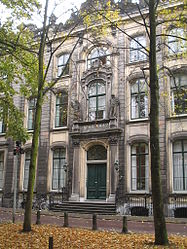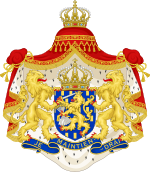- Supreme Court of the Netherlands
-
Supreme Court of the Netherlands Hoge Raad der Nederlanden 
Established 1838 Jurisdiction Netherlands, Curaçao, Sint-Maarten, Aruba Location The Hague, Netherlands Coordinates 52°5′0.52″N 4°18′41.85″E / 52.0834778°N 4.311625°ECoordinates: 52°5′0.52″N 4°18′41.85″E / 52.0834778°N 4.311625°E Composition method Selected by the House of Representatives on advice of the Supreme Court and appointed by Royal Order. Authorized by Constitution of the Netherlands Judge term length Appointed for life until retired at 70 Number of positions 41 Website www.hogeraad.nl President of the Supreme Court Currently Geert Corstens Since 1 October 2008[1] Netherlands 
This article is part of the series:
Politics and government of
the NetherlandsConstitutionCabinetDecentralized gov'tForeign policyRelated subjects
The Supreme Court of the Netherlands (Dutch: Hoge Raad der Nederlanden, High Council of the Netherlands) is the highest court of the Netherlands, Curaçao, Sint Maarten and Aruba.[2] The Court was established on 1 October 1838 and sits in The Hague, Netherlands.[3]
The jurisdiction of the Supreme Court is limited primarily to civil, criminal and tax-related cases. The Court has the authority to overturn rulings by appellate courts (cassation) and therefore establishes case law, but only if the lower court applied the law incorrectly or the ruling lacks sufficient reasoning; facts are no longer subject of discussion.[4] The Court may not rule on the constitutionality of laws passed by the States-General and treaties. Hence the Netherlands has no constitutional court.[5]
The Supreme Court consists of 41 judges: a president, 6 vice-presidents, 31 justices (raadsheren) and 3 justices in exceptional service (buitengewone dienst). All judges are appointed for life, until they retire at the age of 70.[6]
Contents
History
The development of cassation in the Netherlands was heavily influenced by the French during the Batavian Revolution at the end of 18th century. The establishment of the Supreme Court on 1838 brought an end to the Grote Raad van Mechelen and its successor the Hoge Raad van Holland, Zeeland en West-Friesland, which both served as high appellate courts.[3]
Authority
In the Netherlands a case is first heard by one of the five courts of appeal (gerechtshoven). Afterwards any party may file a cassation appeal before the Supreme Court.
Composition and current membership
Justices of the Supreme Court are appointed by Royal Decree, from a list of three, advised by the House of Representatives on the advice of the Hoge Raad itself. The judges are, like every other judge in the Netherlands, appointed for life, until they either die or retire after reaching the age of 70. Upon reaching the age of 60, a justice may change status to exceptional (also known as special) service, with the effect that the judge no longer plays a full role at the court.
The Supreme Court is divided into four chambers: the first or civil chamber, the second or criminal chamber, the third or tax chamber and the fourth or 'ombuds' chamber. The members of the fourth chamber are chosen ad hoc, but will include the president of the court.[6]
First (or civil) chamber
- Hans Fleers, vice-president and chairman
- Detmer Beukenhorst, vice-president
- Oscar de Savornin Lohman, justice
- Annemarie van Buchem-Spapens, justice
- Ernst Numann, justice
- Fred Hammerstein, justice
- Jules van Oven, justice
- Willem van Schendel, justice
- Floris Bakels, justice
- Cees Streefkerk, justice
- W.D.H. Asser, justice
- C.E. Drion, justice
Second (or criminal) chamber
- F.H. Koster, vice-president and chairman
- G.J.M. Corstens, president of Supreme Court
- A.J.A. van Dorst, vice-president
- B.C. de Savornin Lohman, justice
- J.W. Ilsink, justice
- J. de Hullu, justice
- W.M.E. Thomassen, justice
- H.A.G. Splinter-Van Kan, justice
- W.F. Groos, justice
- C.H.W.M. Sterk, justice
- M.A. Loth, justice
- J.P. Balkema, justice in exceptional service
Third (or tax) chamber
- D.G. van Vliet, vice-president
- J.W. van den Berge, vice-president
- C.B. Bavinck, justice
- A.R. Leemreis, justice
- C.J.J. van Maanen, justice
- E.N. Punt, justice
- C. Schaap, justice
- J.W.M. Tijnagel, justice
- A.H.T. Heisterkamp, justice
- J.A.C.A. Overgaauw, justice
- M.W.C. Feteris, justice
- P.M.F. van Loon, justice
- M.A. Fierstra, justice
- R.J. Koopman, justice
- A.E.M. van der Putt-Lauwers, justice in exceptional service
- L. Monné, justice in exceptional service
- P. Lourens, justice in exceptional service
References
- ^ "Benoeming mr. G.J.M. Corstens tot president van de Hoge Raad" (in Dutch). Rechtspraak.nl. Hoge Raad der Nederlanden. 2008-04-15. http://www.rechtspraak.nl/Gerechten/HogeRaad/Actualiteiten/Benoeming+mr.+G.J.M.+Corstens+tot+president+van+de+Hoge+Raad.htm. Retrieved 2009-12-02.
- ^ "Nederlandse Antillen en Aruba" (in Dutch). Rechtspraak.nl. De Rechtspraak. 2007-07-27. http://www.rechtspraak.nl/Gerechten/HogeRaad/Over+de+Hoge+Raad/Nederlandse+Antillen+en+Aruba/. Retrieved 2009-12-02.
- ^ a b "Geschiedenis van de Hoge Raad" (in Dutch). Rechtspraak.nl. De Rechtspraak. 2004-09-18. http://www.rechtspraak.nl/Gerechten/HogeRaad/Over+de+Hoge+Raad/Geschiedenis+van+de+Hoge+Raad.htm. Retrieved 2009-12-02.
- ^ "Supreme Court". Rechtspraak.nl. De Rechtspraak. 2009-08-10. http://www.rechtspraak.nl/Information+in+English/Judicial+system/Supreme+Court.htm. Retrieved 2009-12-02.
- ^ According to article 120 of the Constitution of the Netherlands, judges will not rule on the constitutionality of laws passed by the States-General and treaties.
- ^ a b "Raad" (in Dutch). Rechtspraak.nl. De Rechtspraak. 2004-10-14. http://www.rechtspraak.nl/Gerechten/HogeRaad/Over+de+Hoge+Raad/Organisatie/Raad.htm. Retrieved 2009-12-02.
External links
Supreme Courts of Europe Sovereign
states- Albania
- Andorra
- Armenia
- Austria
- Azerbaijan
- Belarus
- Belgium
- Bosnia and Herzegovina
- Bulgaria
- Croatia
- Cyprus
- Czech Republic
- Denmark
- Estonia
- Finland
- France
- Georgia
- Germany
- Greece
- Hungary
- Iceland
- Ireland
- Italy
- Kazakhstan
- Latvia
- Liechtenstein
- Lithuania
- Luxembourg
- Macedonia
- Malta
- Moldova
- Monaco
- Montenegro
- Netherlands
- Norway
- Poland
- Portugal
- Romania
- Russia
- San Marino
- Serbia
- Slovakia
- Slovenia
- Spain
- Sweden
- Switzerland
- Turkey
- Ukraine
- United Kingdom
- (England
- Northern Ireland
- Scotland
- Wales)
States with limited
recognition- Abkhazia
- Kosovo
- Nagorno-Karabakh
- Northern Cyprus
- South Ossetia
- Transnistria
Other entities Categories:- Dutch law
- Judicial system of the Netherlands
- Aruban society
- Government of Aruba
- Government of the Netherlands Antilles
- Dutch Antillean society
- National supreme courts
- Courts in the Netherlands
- 1838 establishments in the Netherlands
Wikimedia Foundation. 2010.
